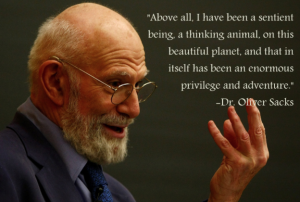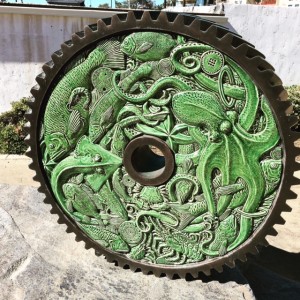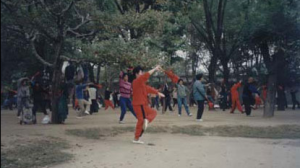“We all age, it is how we age, however, that determines the quality of our lives.” Anthony Ong, Cornell University
Oliver Sachs, M.D. , a noted neurologist and author of many books, including Awakenings, Musicophilia, The Man Who Mistook His Wife for a Hat , once asked, “To what extent are we shaped by, and to what degree do we shape, our own brains? “ Dr. Sachs continued,  “While it is often true that learning is easier in childhood, neuroscientists now know that the brain does not stop growing, even in our later years. Every time we practice an old skill or learn a new one, existing neural connections are strengthened and, over time, neurons create more connections to other neurons. Even new nerve cells can be generated.. . . I have had many reports from ordinary people who take up a new sport or a musical instrument in their 50s or 60s, and not only become quite proficient, but derive great joy from doing so.”
“While it is often true that learning is easier in childhood, neuroscientists now know that the brain does not stop growing, even in our later years. Every time we practice an old skill or learn a new one, existing neural connections are strengthened and, over time, neurons create more connections to other neurons. Even new nerve cells can be generated.. . . I have had many reports from ordinary people who take up a new sport or a musical instrument in their 50s or 60s, and not only become quite proficient, but derive great joy from doing so.”
As a Qigong /Tai Chi teacher and practitioner, learning new Qigong exercises generates new connections in brain and body, and is a bit like learning a new piece of music. It’s necessary to first “memorize” the moves and technique by coordinating the body and breath to move effortlessly together. This involves kinesthetic memory, motor skills and proprioception, as well as mentally and visually following the rhythm, and sometimes changing the tempo of a Flow. A Flow routine is a moving mindfulness meditation composed of a series of movements repeatedly done together in sequence. Tai Chi is essentially one long flow of qigong exercises. With repeat practice of any Flow, one’s BodyMind develops a continuum of sorts and the thinking brain surrenders. In “the zone”,a Qi moment, the invisible energy of Qi effortlessly moves the practitioner. This ignites the body’s own self-healing mechanisms and builds internal power. I don’t know specifically what is happening in the brain, but I imagine Dr. Sachs’ encouraging smile at these associations!
“The combination of mental and physical practice leads to greater performance improvement than does physical practice alone, a phenomenon for which our findings  provide a physiological explanation. ” Alvaro Pascual-Leone, MD, PhD, Harvard Medical School. Simply translated: there are multiple benefits for your brain and body to be discovered in your practice of Qigong, as this also requires mental focus and repeated physical movements with coordinated breath and vocal patterns.
provide a physiological explanation. ” Alvaro Pascual-Leone, MD, PhD, Harvard Medical School. Simply translated: there are multiple benefits for your brain and body to be discovered in your practice of Qigong, as this also requires mental focus and repeated physical movements with coordinated breath and vocal patterns.
Dr Sachs continued in “This Year, Change Your Mind” OP-ED NY Times, Dec 31, 2010 with “Music is an especially powerful shaping force, for listening to and especially playing it engages many different areas of the brain, all of which must work in tandem: from reading musical notation and coordinating fine muscle movements in the hands, to evaluating and expressing rhythm and pitch, to associating music with memories and emotion.” Dr Sachs played music all his life; he even recommenced piano lessons to improve his performance at age 75. Thank-you Dr. Sachs ( 1933- August 2015) your influence and insights live on.
Human brains continue to grow all of our lives. We are never too old to begin something new! Like learning to play a piano or becoming a Qigong master, doing anything well requires time, discipline and lots of practice. But the daily act of moving Qi manifests its own rewards. Mastery is a journey, not a destination. Just visit China today and admire all the centenarians practicing Qigong and Tai Chi.
Modern human beings are masters of adaptation, and our brain may be the director of how we humans adapt and how these changes affect the quality and choices of our lives.

